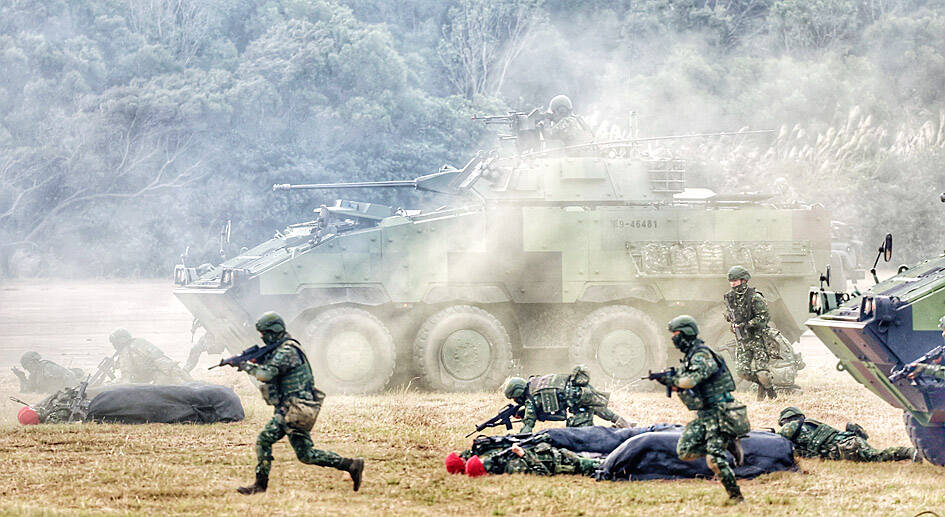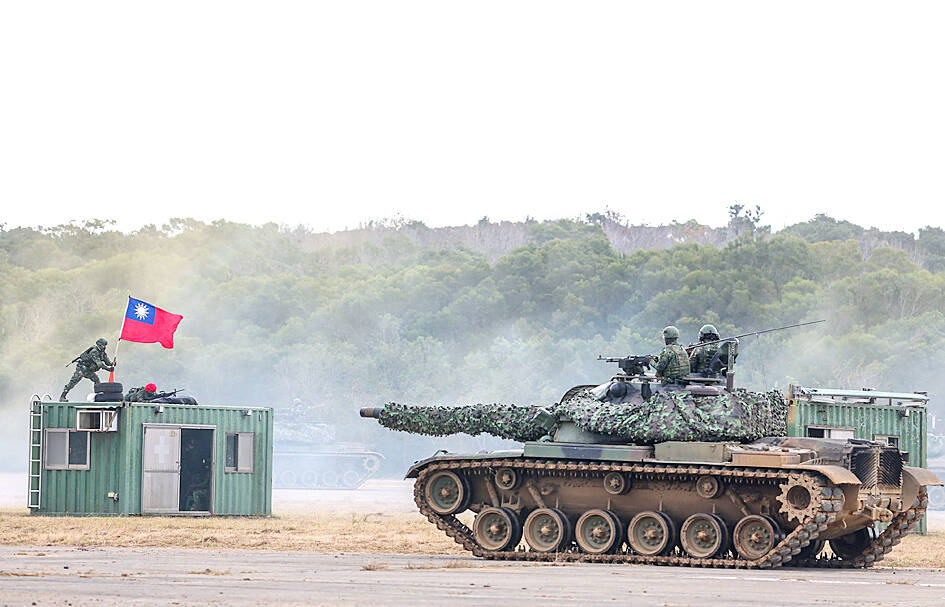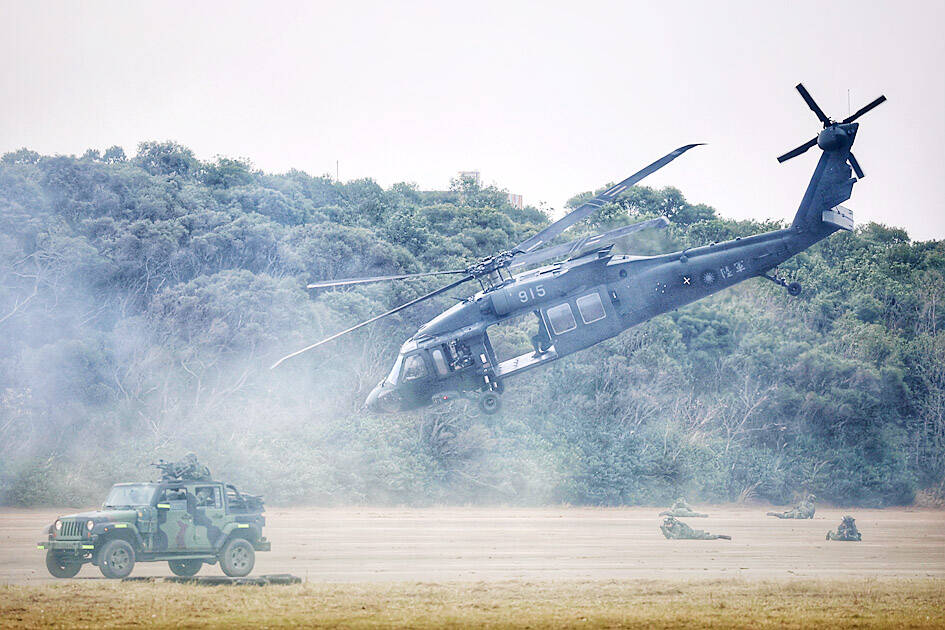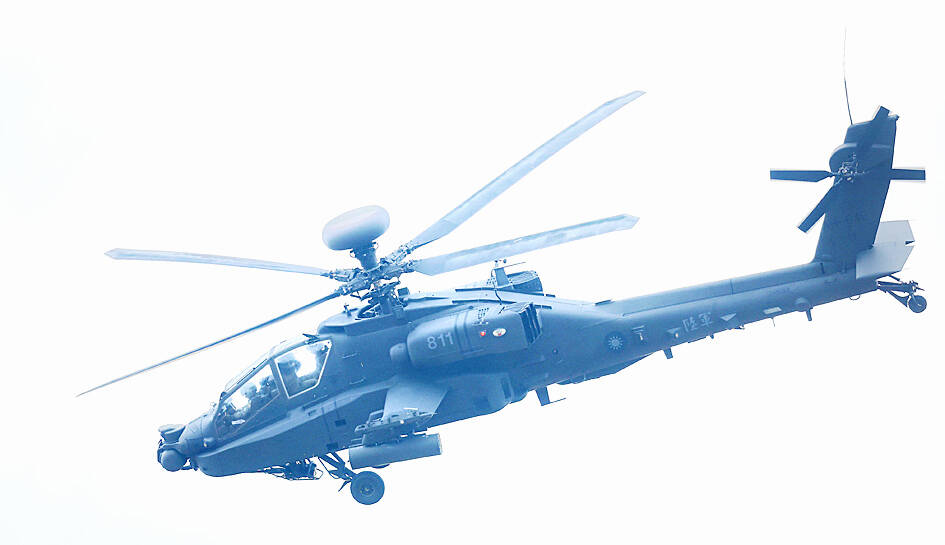The military yesterday began three days of drills as concerns rose over potential cuts to the defense budget due to legislative wrangling.
The drills began in the north with tank maneuvering at a base in Hsinchu County featuring outmoded CM-11 tanks, which are gradually being replaced by newly purchased M1A2T Abrams from the US.
The replacement marks a huge upgrade despite some complaints over the weight of the new vehicles and their likely effectiveness at preventing a possible Chinese landing.

Photo: CNA
Soldiers arrived on armored personnel carriers, while Apache and Sikorsky S-70 helicopters whirled overhead, providing reconnaissance and covering fire.
With the equipment the military currently operates, a communication officer on the ground can coordinate airborne attacks, Army Captain Chuang Yuan-cheng (莊沅澂) said of the 542 Armored Brigade in Hsinchu County.
Today, the army is to show off its Patriot III anti-missile system aimed at countering one of China’s most potent weapons. Tomorrow, anti-submarine exercises are to be held off the Port of Kaohsiung, considered China’s best conduit for resupplying its troops should it establish a beachhead in the heavily defended region.

Photo: I-Hwa Cheng, AFP
The annual drills are held in the run-up to the Lunar New Year holiday to reassure the population of the military’s ability to meet China’s threats and to boost recruitment.
Taiwan has a backlog of orders from the US for about US$20 billion in weapons systems, while it upgrades its F-16 jets and develops its own submarines. It has also extended compulsory military service to one year.
However, the government has warned that new legal amendments being considered could force a 28 percent cut in the defense budget by altering the way funds are distributed between the central and local governments.

Photo: CNA
That in turn could reduce the willingness of the US and its allies such as Japan and the Philippines to assist Taiwan in the event of an armed clash with China, National Security Council Secretary-General Joseph Wu (吳釗燮) told legislators last month.
The legislation is being pushed by the main opposition Chinese Nationalist Party (KMT), which has joined with the Taiwan People’s Party to oppose the ruling Democratic Progressive Party’s legislative agenda.
Taiwan annually spends about 2.4 percent of its GDP, or about US$20 billion, on the military.

Photo: CNA
China has responded furiously to all US arms sales to Taiwan, saying that unification is inevitable and warning that Washington is “playing with fire.”
However, neither military intimidation, economic coercion nor appeals to their common Chinese ancestry seem to be working on Taiwanese, the vast majority of whom favor the current status of de facto independence.

Taiwan is to commence mass production of the Tien Kung (天弓, “Sky Bow”) III, IV and V missiles by the second quarter of this year if the legislature approves the government’s NT$1.25 trillion (US$39.78 billion) special defense budget, an official said yesterday. Commenting on condition of anonymity, a defense official with knowledge of the matter said that the advanced systems are expected to provide crucial capabilities against ballistic and cruise missiles for the proposed “T-Dome,” an advanced, multi-layered air defense network. The Tien Kung III is an air defense missile with a maximum interception altitude of 35km. The Tien Kung IV and V

The disruption of 941 flights in and out of Taiwan due to China’s large-scale military exercises was no accident, but rather the result of a “quasi-blockade” used to simulate creating the air and sea routes needed for an amphibious landing, a military expert said. The disruptions occurred on Tuesday and lasted about 10 hours as China conducted live-fire drills in the Taiwan Strait. The Civil Aviation Administration (CAA) said the exercises affected 857 international flights and 84 domestic flights, affecting more than 100,000 travelers. Su Tzu-yun (蘇紫雲), a research fellow at the government-sponsored Institute for National Defense and Security Research, said the air

A strong continental cold air mass is to bring pollutants to Taiwan from tomorrow, the Ministry of Environment said today, as it issued an “orange” air quality alert for most of the country. All of Taiwan except for Hualien and Taitung counties is to be under an “orange” air quality alert tomorrow, indicating air quality that is unhealthy for sensitive groups. In China, areas from Shandong to Shanghai have been enveloped in haze since Saturday, the ministry said in a news release. Yesterday, hourly concentrations of PM2.5 in these areas ranged from 65 to 160 micrograms per cubic meter (mg/m³), and pollutants were

Taiwan lacks effective and cost-efficient armaments to intercept rockets, making the planned “T-Dome” interception system necessary, two experts said on Tuesday. The concerns were raised after China’s military fired two waves of rockets during live-fire drills around Taiwan on Tuesday, part of two-day exercises code-named “Justice Mission 2025.” The first wave involved 17 rockets launched at 9am from Pingtan in China’s Fujian Province, according to Lieutenant General Hsieh Jih-sheng (謝日升) of the Office of the Deputy Chief of the General Staff for Intelligence at the Ministry of National Defense. Those rockets landed 70 nautical miles (129.6km) northeast of Keelung without flying over Taiwan,